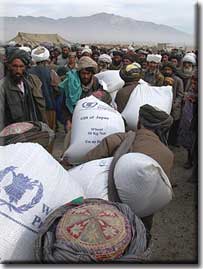Food Security in Afghanistan: Reports from the Field
Image on right: Afghans receive food assistance at a camp run by the World Food Program near Hirat, Afghanistan. (Photo: World Food Program/Alejandro Chicheri)
 What is the outlook for food security as Afghanistan heads into its second winter since the fall of the Taliban? On November 5, the Institute hosted a Current Issues Briefing to explore this issue from several perspectives, including:
What is the outlook for food security as Afghanistan heads into its second winter since the fall of the Taliban? On November 5, the Institute hosted a Current Issues Briefing to explore this issue from several perspectives, including:
- What has been the effect of Afghanistan's nine year drought on nourishment, nutrition, and agricultural production?
- What is the current state of food security in the country and to what extent might the onset of winter and a steady flow of returning refugees threaten famine in Afghanistan?
- How effective have food contributions by donor countries and organizations been in assisting the interim government's efforts to feed Afghanis?
- What are the prospects for the spring planting season and what plans are under consideration by the United States and others for assistance?
Moderated by Institute South Asia specialist Deepa Ollapally, the discussion was webcast live (audio only) and followed by questions from the floor and the Internet audience.
Speakers
- Neamat Nojumi
Author, The Rise of the Taliban in Afghanistan (Palgrave Macmillan 2002), Afghan political activist, and former mujahedin fighter - M. Saleh Keshawarz
Civil and Engineering Department, University of Hartford - Ross Wherry
Near East and Asia Bureau, U.S. Agency for International Development
Moderator
- Deepa Ollapally
South Asia specialist and program officer, Special Initiative on the Muslim World, U.S. Institute of Peace



